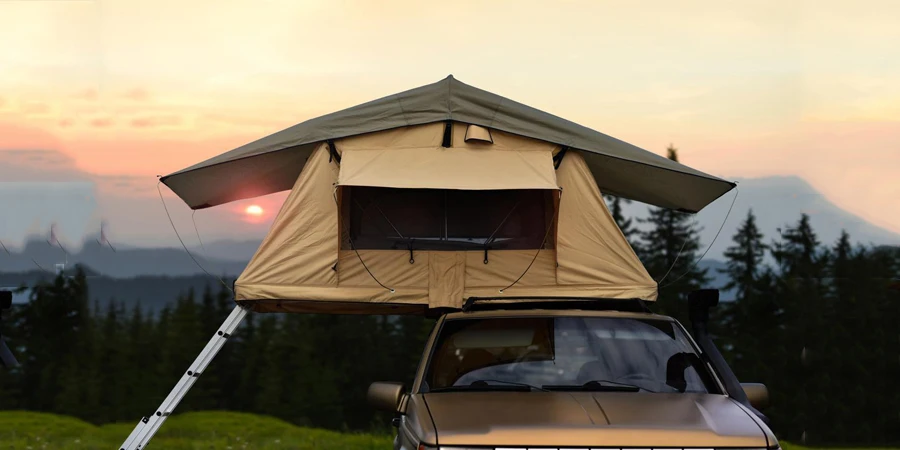Table of Contents
1. Introduction
2. Market overview
3. Key considerations when selecting car rooftop tents
4. Top car rooftop tents of 2025 and their features
5. Conclusion
Introduction
The popularity and demand for car rooftop tents have surged in the US market, driven by an increasing number of outdoor enthusiasts and adventurers seeking convenience and comfort. These versatile tents transform vehicles into mobile campsites, offering users the freedom to explore remote locations without the hassle of traditional ground tents. They provide elevated sleeping spaces, protecting campers from uneven terrain, critters, and adverse weather. With quick setup times and the ability to store bedding inside, rooftop tents enhance the camping experience, making it more enjoyable and accessible for everyone from solo travelers to families. For retailers, this growing trend presents a lucrative opportunity to cater to a market hungry for innovation and adventure.
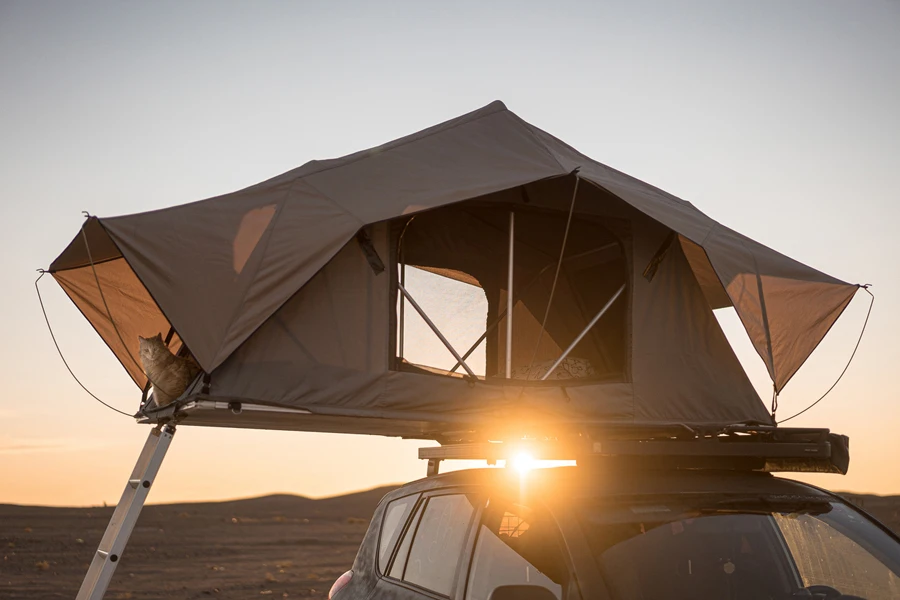
Market Overview
Current Market Trends
The US market for outdoor and adventure gear, particularly car rooftop tents, has experienced significant growth in recent years. This trend reflects the increasing desire among consumers to explore nature and engage in outdoor activities. According to recent market research, the camping equipment market in the US was valued at over $2.5 billion in 2023 and is expected to grow steadily. The surge in popularity of rooftop tents is driven by their convenience, versatility, and the unique camping experience they offer, allowing users to set up camp quickly and securely on top of their vehicles. These tents cater to a growing demographic of adventure seekers and families looking for more comfortable and efficient camping solutions.
Consumer Demographics
Understanding the demographics of consumers interested in car rooftop tents is crucial for online retailers. The primary market for these products includes outdoor enthusiasts aged 25 to 45, with a significant portion of sales coming from higher-income households. These consumers are often willing to invest in high-quality gear that enhances their outdoor experiences. Additionally, there is a notable interest from families and young couples who prioritize convenience and comfort while camping. Geographically, the highest demand comes from regions with abundant natural landscapes, such as the Pacific Northwest, Rocky Mountains, and parts of the Southeast, where camping and outdoor activities are deeply ingrained in the local culture.
Car rooftop tents appeal to a diverse range of customers, including solo travelers, adventure groups, and tech-savvy millennials who seek innovative camping solutions. The trend also aligns with the broader movement towards sustainability and eco-friendly travel, as these tents reduce the need for traditional accommodations and promote outdoor recreation. This demographic insight helps retailers target their marketing strategies effectively, ensuring they reach the right audience with tailored product offerings and promotions.
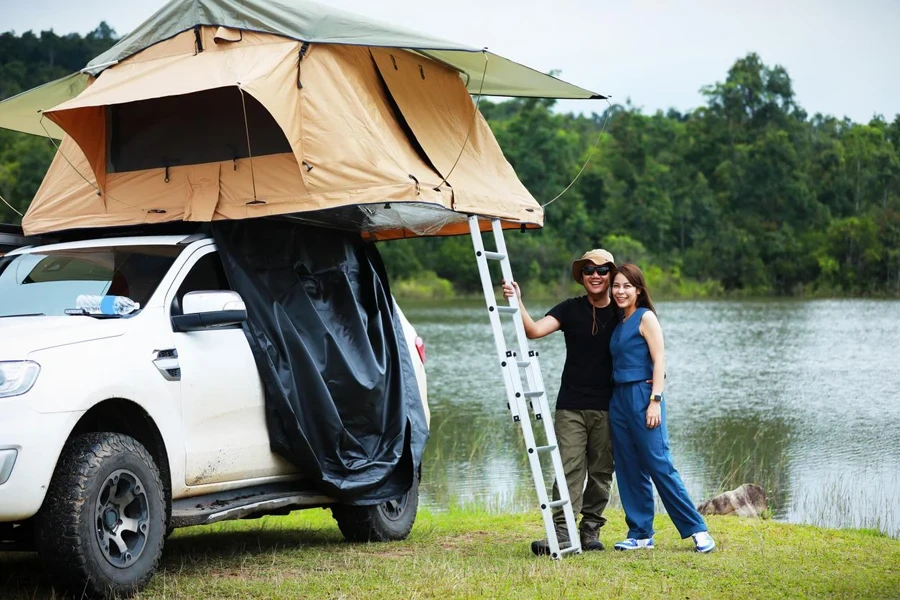
Key Considerations When Selecting Car Rooftop Tents
Compatibility and Fit
Ensuring that a car rooftop tent fits various vehicle types and roof racks is crucial for both functionality and safety. Different vehicles have varying roof load capacities and dimensions, which must be compatible with the tent’s specifications. Key measurements to consider include the dynamic weight rating, which is the weight the roof can handle while the vehicle is in motion, and the static weight rating, which is the weight it can support when stationary. Retailers should provide clear guidelines and compatibility charts to help customers choose the right tent for their vehicle type. Additionally, considering the spread of the roof bars and the type of mounting system is essential to ensure a secure fit.
Material and Durability
The materials used in the construction of car rooftop tents significantly impact their performance and longevity. High-quality materials like polycotton canvas, ripstop polyester, and ABS plastic are commonly used for their durability and weather resistance. Polycotton canvas is favored for its breathability and resistance to tearing, while ripstop polyester offers excellent waterproofing and UV protection. ABS plastic is used in hardshell tents for its lightweight and robust properties. Weather resistance is a critical factor, especially for those camping in varying climates. A durable tent not only withstands harsh conditions but also provides a comfortable and secure shelter for users, ensuring they get the most out of their investment.
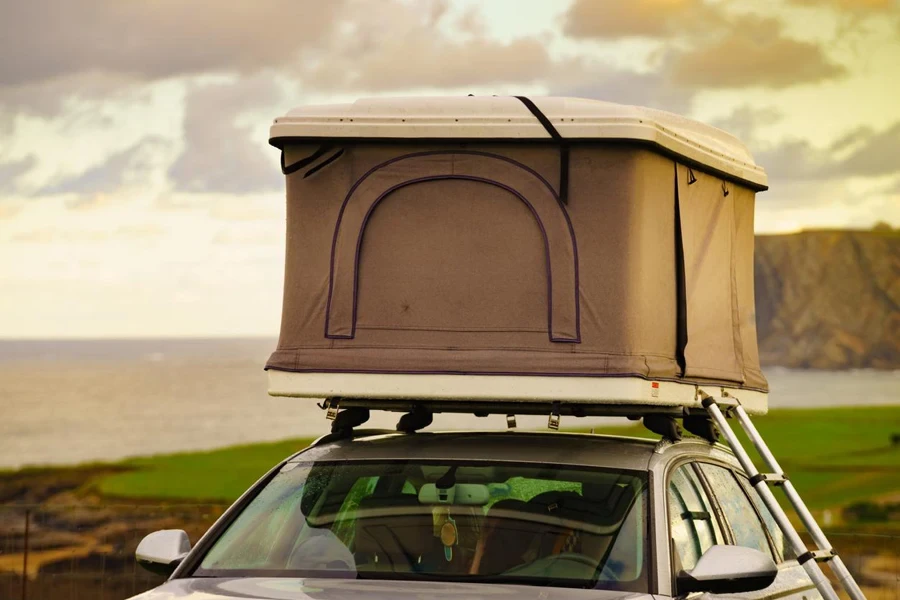
Ease of Setup and Use
One of the primary advantages of car rooftop tents is their ease of setup compared to traditional ground tents. Features such as hydraulic struts and quick-release mechanisms can drastically reduce setup time, making the camping experience more enjoyable and less labor-intensive. Hydraulic struts help in the easy opening and closing of hardshell tents, while quick-release mechanisms facilitate swift attachment and detachment from the vehicle. User-friendly designs that include intuitive assembly instructions and minimal required tools are essential for customer satisfaction. Retailers should highlight these features to attract buyers looking for convenience and ease of use.
Comfort and Space
Comfort is a significant consideration when selecting a car rooftop tent. Factors affecting comfort include mattress quality, ventilation, and interior space. High-density foam mattresses provide superior comfort and support, enhancing the sleeping experience. Adequate ventilation, achieved through mesh windows and ventilation panels, is essential to prevent condensation and maintain airflow. Comparing hardshell and softshell tents, hardshell models often offer better insulation and durability, while softshell tents tend to provide more interior space and better ventilation. Understanding these differences can help customers choose a tent that best fits their comfort needs.
Price and Value
The price range for car rooftop tents varies widely, with basic models starting around $1,500 and premium options exceeding $3,500. Factors that justify higher costs include advanced materials, superior build quality, additional features, and brand reputation. For instance, hardshell tents are generally more expensive due to their robust construction and ease of use. However, they offer better long-term value through durability and reduced setup time. On the other hand, softshell tents, while more affordable, provide excellent value for money with their spacious interiors and enhanced ventilation. Retailers should guide customers by highlighting the value propositions of different models, ensuring they find the best fit for their budget and requirements.

Top Car Rooftop Tents of 2025 and Their Features
Best Overall: iKamper Skycamp 3.0 Mini
The iKamper Skycamp 3.0 Mini stands out as the best overall car rooftop tent for 2024 due to its compact size, ease of setup, and durability. Weighing only 125 pounds, this model is compatible with most vehicles, including hatchbacks and compact cars. Its hard shell design ensures a quick setup, taking less than three minutes to transform into a comfortable sleeping area. The Skycamp 3.0 Mini also features a high-loft polyfoam mattress and insulated inner shell, providing comfort in all four seasons. This model is ideal for couples and solo travelers who prioritize convenience and quality.
Best Budget Option: Smittybilt GEN2 Overlander
For those on a budget, the Smittybilt GEN2 Overlander offers an excellent balance of affordability and features. Priced significantly lower than many competitors, this tent does not compromise on quality. It includes a durable anodized aluminum frame and a 600-denier ripstop polyester canopy, ensuring protection against the elements. The GEN2 Overlander also comes with a telescoping ladder, LED strip lighting, and generous windows for ventilation. This tent is perfect for budget-conscious consumers who want a reliable and comfortable camping experience without breaking the bank.
Best for Comfort: Roofnest Sparrow EYE
The Roofnest Sparrow EYE is renowned for its exceptional comfort features, making it the top choice for those seeking a luxurious camping experience. This hardshell tent includes a thick, high-density foam mattress that offers superior support and comfort. The Sparrow EYE also boasts ample ventilation through its mesh windows and built-in fan, ensuring a pleasant sleeping environment. Additionally, its hydraulic struts allow for effortless setup and takedown. This model is ideal for campers who value comfort and ease of use, making it a popular choice among families and solo adventurers alike.
Best for Families: iKamper Skycamp 3.0
The iKamper Skycamp 3.0 is the best option for families, thanks to its spacious interior and user-friendly design. This model can comfortably accommodate up to four people, making it perfect for family camping trips. Its robust construction features a fiber-reinforced plastic hard shell and a thick polycotton canvas, ensuring durability and weather resistance. The Skycamp 3.0 also includes a king-size mattress, large windows for ventilation, and a quick setup mechanism. This tent is designed to provide a home-like experience in the wilderness, catering to families who need both space and convenience.
Best Low-Profile Design: Roofnest Falcon 3 EVO
The Roofnest Falcon 3 EVO excels in both functionality and aesthetics, making it the best low-profile design for 2024. With a sleek 8-inch tall profile when closed, this tent minimizes wind resistance and enhances fuel efficiency. Its ABS shell is coated with Line-X for added durability and UV resistance. The Falcon 3 EVO features a unique U-bar design, increasing head and foot space by over 30%. It also includes a two-inch memory foam mattress and oversized mesh windows for optimal comfort. This model is perfect for travelers who prioritize a streamlined look and efficient performance.
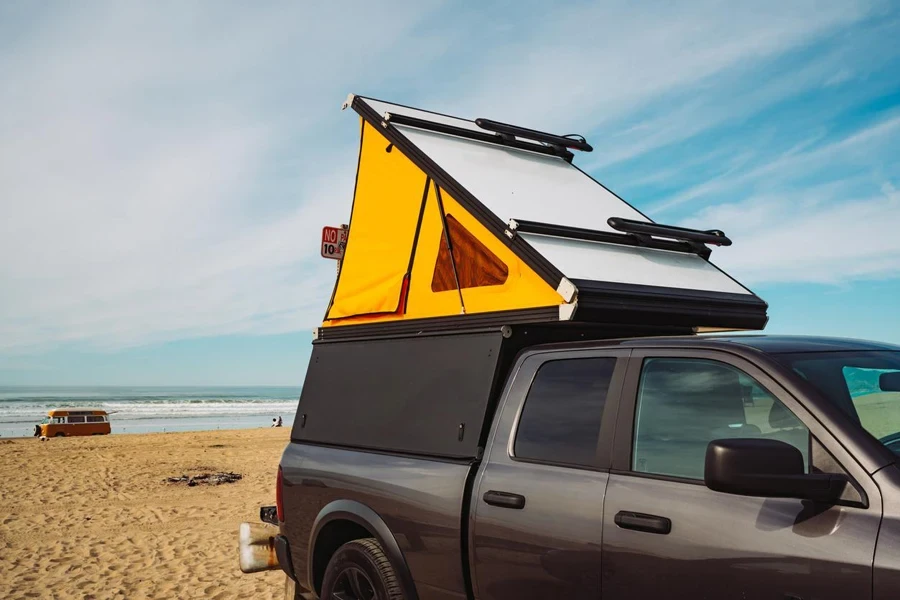
Conclusion
Selecting the right car rooftop tent is crucial for meeting the diverse needs of outdoor enthusiasts. Whether prioritizing comfort, budget, space, or design, understanding the features and benefits of each model helps retailers make informed purchasing decisions. Staying updated with market trends and consumer preferences ensures that retailers can offer the best products to satisfy their customers and capitalize on the growing demand for car rooftop tents.
